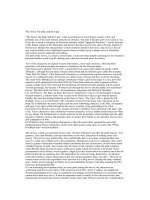30842 good and bad manners
Bạn đang xem bản rút gọn của tài liệu. Xem và tải ngay bản đầy đủ của tài liệu tại đây (125.4 KB, 6 trang )
Mind Your Manners
‘Social tact is making your guests feel at home, even though you wish they were.’
Read these extracts, which describe what is considered the polite things to do when invited to a social occasion in
Britain. Discuss these questions.
1. Are any of the ‘rules’ the same in your country? Are any completely different?
2. Which of the rules seem sensible? Do any seem ridiculous?
3. Decide whether the given sentences are true (T) or false (F).
A. If you are invited for 8 pm, you should arrive about 10 – 15 minutes later.
In fact, it’s impossible to arrive exactly on time. F - (we should be on time, punctually)
B. It’s not necessary to bring a gift for the hosts, but flowers or chocolates will always be appreciated. T
C. The host should introduce you to other guests you don’t know, but you can introduce yourself if he/she
doesn’t do this. A smile and ‘Hello’ is enough at an informal party – you don’t have to shake hands. F - (you
have to shake hands)
D. Smokers should ask the host and other guests before lightning up at the table, and should be prepared to
take no for an answer. No one should smoke until the end of the meal. T
E. Say thank you, by telephone or letter, but say it promptly, within a couple of days at the most. T
Decide what it would be good manners to do in these situations.
a. Someone stars to tell you a story they’ve already told you before.
b. A friend asks you to give your honest opinion of a new item of clothing they’ve bought. (you think it’s
awful)
c. You have been invited to dinner but miscalculate the journey and arrive half an hour early.
d. You have invited friends to dinner but they arrive before you’ve finished cooking.
TEXT PREDICTION
Before you read the text on the next page, decide which of the following would cause offence.
1.Which gift would a Chinese friend consider to be in bad taste?
an alarm clock
a laptop computer
a calculator
2.Which gift could offend a Hindu colleague in India?
a silver pen and pencil set
a cut glass vase
a leather briefcase
3.Which gesture would cause offence in Greece?
tapping one side of the nose with the index finger
the US and British OK sign, thumb and finger touching in a circle
kissing the fingertips
4.Which way of calling the waiter is considered rude in Japan?
raising and moving the index finger towards you
moving the whole hand towards you
catching the waiter’s eye and moving the head backwards quickly
For questions 1-6, you must choose which of paragraphs A-G fit into the numbered gaps in the following
newspaper article.
MUST ONE BE SO POLITE THAT IT HURTS?
By Sherry Buchanan
International Herald Tribune
NEW YORK - When in China, don't give a clock as a gift. It symbolizes death. When in Greece, don't
make the OK sign, thumb and forefinger touching in a circle. It is an offensive gesture. When in India;
don't give a Hindu a gift made of cowhide. It is sacrilegious.
1……….
Some visitors follow a rule of thumb. They weigh how much displeasing their host matters to them
against their degree of personal discomfort.
'During our briefings, we help people develop respect for the country they are going to live in,' said
Claire Stewart, who works for an organization which teaches manners to people being transferred
overseas by their companies or universities.
Letitia Baldridge, an authority on manners in the United States and the author of a book on the subject,
said:
'Good manners are not elite, artificial or snobbish ways of behaving. Manners are a combination of
common sense and consideration for others.
It's 75 per cent common sense and 25 per cent thinking
about others.'
2……….
Her advice covers every aspect of social behavior, including smoking manners, flag etiquette for
banquets, writing letters of apology, and the proper form for business cards.
Everywhere, it has become extremely complicated to be polite. Not only are customs different but in
many countries standards of behavior have changed in recent years.
3……..
'I had the option of not going in, but you feel a bit of a fool if everybody else in there is naked,' said the
banker, who decided to take the plunge. To make matters worse, he was attending the house party with
his boss. The hot-tub session, during which business was discussed, lasted three hours.
4…….
Mrs Stewart said she believed that the banker had done the right thing, although he had an option. He
could 'have had the sangfroid to decline with grace without' making the Australians feel stupid,' she said.
5…….
Alexander Moorrees, a young American investment banker in London, was invited by some British
friends to spend a weekend at their home in the country. The weather was below freezing. The manor
house to which he had been invited had no central heating and the bedrooms had no fireplaces. 'I kept
waking up every hour to make sure I was still breathing,' said Mr Moorrees. 'I was worried I was going to
die of hypothermia.'
Finally, at 3 a.m., fearing for his health, he took all his blankets, went down to the main living room, built
a fire in the large fireplace, and went to sleep in front of it. He has not been invited back.
6……..
A. 'Even though it felt quite good, an Englishman's reserve scarcely allows him to feel comfortable in these
circumstances,' he said. 'Coming out is just as embarrassing. I was all wrinkly.'
B. He could have followed Ms Baldridge's rule No. 2 when visiting a foreign country: 'Become familiar
with the dress code in that country.' If so, he might have added long Johns and a ski mask to his wardrobe.
C. A young British banker recently found himself at a house party in Sydney. After a barbecue, the hosts
invited everyone to climb into a large bath tub to relax. The hosts' rule was that to participate you had to
take your clothes off.
D. Knowing how to behave abroad can save people from some major social gaffes. However, etiquette
writers and experts disagree over how far people should go in complying with foreign habits and customs
that can create great discomfort to the uninitiated.
E.In a business situation, 'short of doing something unethical,' the best advice is usually 'to go along with
whatever the foreign custom is,' she added.
F.Ms Baldridge, who began her career as social secretary to an ambassador and his wife at the US
embassy in Paris, now teaches manners to international executives and charges thousands of dollars a
session.
Mind Your Manners
‘Social tact is making your guests feel at home, even though you wi sh they were.’
Read these extracts, which describe what is considered the polite things to do when invited to a social
occasion in Britain. Discuss these questions.
4. Are any of the ‘rules’ the same in your country? Are any completely different?
5. Which of the rules seem sensible? Do any seem ridiculous?
6. Decide whether the given sentences are true (T) or false (F).
E. If you are invited for 8 pm, you should arrive about 10 – 15 minutes later.
In fact, it’s impossible to arrive exactly on time.
F.
It’s not necessary to bring a gift for the hosts, but flowers or chocolates will always be appreciated.
G. The host should introduce you to other guests you don’t know, but you can introduce yourself if
he/she doesn’t do this. A smile and ‘Hello’ is enough at an informal party – you don’t have to shake
hands.
H. Smokers should ask the host and other guests before lightning up at the table, and should be
prepared to take no for an answer. No one should smoke until the end of the meal.
I.
Say thank you, by telephone or letter, but say it promptly, within a couple of days at the most.
Decide what it would be good manners to do in these situations.
e. Someone stars to tell you a story they’ve already told you before.
f. A friend asks you to give your honest opinion of a new item of clothing they’ve bought. (you think it’s
awful)
g. You have been invited to dinner but miscalculate the journey and arrive half an hour early.
h. You have invited friends to dinner but they arrive before you’ve finished cooking.
TEXT PREDICTION
Before you read the text on the next page, decide which of the following would cause offence.
1.Which gift would a Chinese friend consider to be in bad taste?
an alarm clock
a laptop computer
a calculator
2.Which gift could offend a Hindu colleague in India?
a silver pen and pencil set
a cut glass vase
a leather briefcase
3.Which gesture would cause offence in Greece?
tapping one side of the nose with the index finger
the US and British OK sign, thumb and finger touching in a circle
kissing the fingertips
4.Which way of calling the waiter is considered rude in Japan?
raising and moving the index finger towards you
moving the whole hand towards you
catching the waiter’s eye and moving the head backwards quickly
For questions 1-6, you must choose which of paragraphs A-G fit into the numbered gaps in the following
newspaper article.
MUST ONE BE SO POLITE THAT IT HURTS?
By Sherry Buchanan
International Herald Tribune
NEW YORK - When in China, don't give a clock as a gift. It symbolizes death. When in Greece, don't
make the OK sign, thumb and forefinger touching in a circle. It is an offensive gesture. When in India;
don't give a Hindu a gift made of cowhide. It is sacrilegious.
1……….
Some visitors follow a rule of thumb. They weigh how much displeasing their host matters to them
against their degree of personal discomfort.
'During our briefings, we help people develop respect for the country they are going to live in,' said
Claire Stewart, who works for an organization which teaches manners to people being transferred
overseas by their companies or universities.
Letitia Baldridge, an authority on manners in the United States and the author of a book on the subject,
said:
'Good manners are not elite, artificial or snobbish ways of behaving. Manners are a combination of
common sense and consideration for others.
It's 75 per cent common sense and 25 per cent thinking
about others.'
2……….
Her advice covers every aspect of social behavior, including smoking manners, flag etiquette for
banquets, writing letters of apology, and the proper form for business cards.
Everywhere, it has become extremely complicated to be polite. Not only are customs different but in
many countries standards of behavior have changed in recent years.
3……..
'I had the option of not going in, but you feel a bit of a fool if everybody else in there is naked,' said the
banker, who decided to take the plunge. To make matters worse, he was attending the house party with
his boss. The hot-tub session, during which business was discussed, lasted three hours.
4…….
Mrs Stewart said she believed that the banker had done the right thing, although he had an option. He
could 'have had the sangfroid to decline with grace without' making the Australians feel stupid,' she said.
5…….
Alexander Moorrees, a young American investment banker in London, was invited by some British
friends to spend a weekend at their home in the country. The weather was below freezing. The manor
house to which he had been invited had no central heating and the bedrooms had no fireplaces. 'I kept
waking up every hour to make sure I was still breathing,' said Mr Moorrees. 'I was worried I was going to
die of hypothermia.'
Finally, at 3 a.m., fearing for his health, he took all his blankets, went down to the main living room, built
a fire in the large fireplace, and went to sleep in front of it. He has not been invited back.
6……..
A. 'Even though it felt quite good, an Englishman's reserve scarcely allows him to feel comfortable in these
circumstances,' he said. 'Coming out is just as embarrassing. I was all wrinkly.'
B. He could have followed Ms Baldridge's rule No. 2 when visiting a foreign country: 'Become familiar
with the dress code in that country.' If so, he might have added long Johns and a ski mask to his wardrobe.
C. A young British banker recently found himself at a house party in Sydney. After a barbecue, the hosts
invited everyone to climb into a large bath tub to relax. The hosts' rule was that to participate you had to
take your clothes off.
D. Knowing how to behave abroad can save people from some major social gaffes. However, etiquette
writers and experts disagree over how far people should go in complying with foreign habits and customs
that can create great discomfort to the uninitiated.
E.In a business situation, 'short of doing something unethical,' the best advice is usually 'to go along with
whatever the foreign custom is,' she added.
F.Ms Baldridge, who began her career as social secretary to an ambassador and his wife at the US
embassy in Paris, now teaches manners to international executives and charges thousands of dollars a
session.









